Competing Narratives
Standing Up for Liberal Values

The word was center of "Competing Narratives" | Photo: Bernhard Ludewig
The power of words: In Berlin, literary and political theorists, philosophers, journalists and scientists discussed on “Competing Narratives” and tried to figure out why the liberal narrative is at crisis. Johannes Ebert hopes for new insights in the work between Goethe-Institut, cultural and social partners. Cornelius Wüllenkemper talked to some participants of the conference and wrote for Deutschlandfunk.
Often a well-told story is more powerful than reason and objective observation. And thanks to new technologies, today everyone can tell their story and spread it worldwide at will.
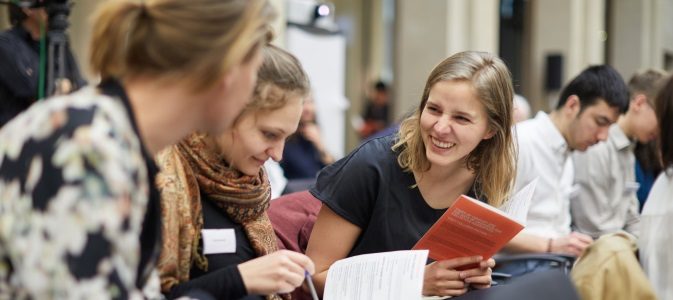 Participants of "Competing Narratives“ in exchange.
| Photo: Bernhard Ludewig
Participants of "Competing Narratives“ in exchange.
| Photo: Bernhard Ludewig
Liberalism’s crisis in confidence
The literary scholar Albrecht Koschorke, for example, is convinced of a fundamental disruption in the liberal democratic organizing principle of the political and media representation of the individual. He speaks of a system-relevant crisis in confidence in liberalism:“If someone says: ‘Everybody get involved!’ And that perhaps under mass media conditions lacking certain control functions that may have a sort of elder authoritarian nature, a tad paternalistic, a tad know-it-all, but then also have a controlling function so that not every fake news story instantly permeates the news – then participation is a dangerous manoeuvre.” Koschorke stated at the conference about “Competing Narratives”, which was a collaboration between Goethe-Institut, Bundesverband Deutscher Industrie, Global Cooperation Research and Heinrich-Böll-Stiftung.
The basic idea of liberalism is to generate social progress through justice by means of enlightenment and participation and this no longer has the desired effect, according to Koschorke. Without this promise, however, liberalism has little to offer and nothing to say.
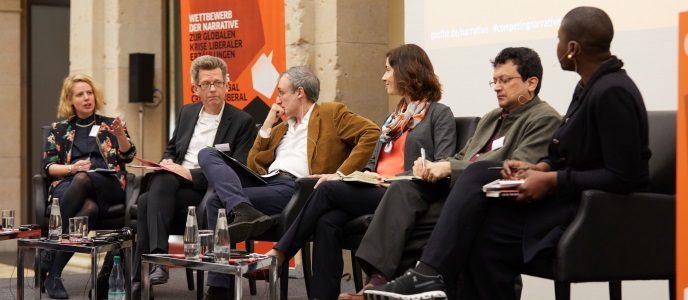 Discussion on "Competing Narratives".
| Photo: Bernhard Ludewig
Are we dealing with a “global crisis of liberal narratives” as the name of the conference in Berlin claims?
Discussion on "Competing Narratives".
| Photo: Bernhard Ludewig
Are we dealing with a “global crisis of liberal narratives” as the name of the conference in Berlin claims?
Division in the community of shared values
It’s not quite that simple; it is important that we differentiate. In Russia, for example, the Moscow political scientist Ekaterina Schulmann sees a division in the community of shared values. The ideas of the liberal democratic society are far more widespread than is perceived in the West, but also in Russia itself:“The state media in Russia spread an image in which the people are backward and rural and all adhere to Christian-Orthodox values. The state, on the other hand, is a pole of progressiveness that contains the barbaric forces of the people. Alongside this media reality, however, there is another, genuine reality, namely the division of communities of shared values: The Russian elites are very homogeneous, consisting of men around the age of 50 coming from the strict hierarchical structures of the military or secret services who believe in traditional values. They are convinced that the rest of society thinks as they do or even more radically. But this is by no means the case.”
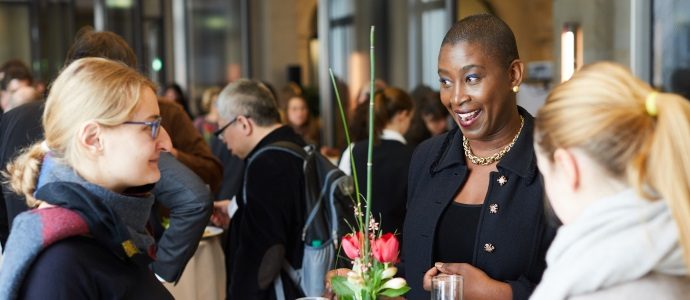 Participants of the Conference "Competing Narratives“.
| Photo: Bernhard Ludewig
Participants of the Conference "Competing Narratives“.
| Photo: Bernhard Ludewig
“A newly constructed, imperialistic authoritarian mania” in Turkey
The problem of authoritarian regimes therefore lies in the insufficient representation of communities of shared liberal values in the media and politics. This is how Essen-based Turkey expert Kader Konuk explains the nationalistic narrative and rhetorical escalation in Turkey. The Turkish governing party, AKP, uses inherited anti-laic nationalist narratives:“This resurrection of the Ottoman, the return of the Ottoman to the AKP’s cultural policy of today, which tries to fill political Islam with old Ottoman substance is really about the narrative of neo-imperialism that the AKP is attempting to embody today. It does not have much to do with Ottomanism as such, but is a newly constructed, imperialistic authoritarian mania filled with Ottoman substance and cultural assets.”
The power of this narrative is revealed, for example, in the epic martyrdom film Fetih 1453 about the conquest of Constantinople. With a price tag of 16 million dollars, it is the most expensive production of Turkish film history.
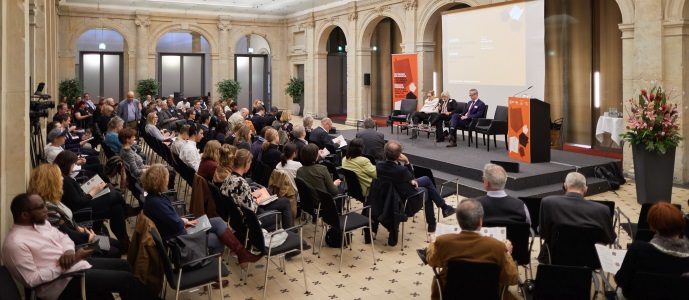 Discussion on "Competing Narratives“.
| Photo: Bernhard Ludewig
Discussion on "Competing Narratives“.
| Photo: Bernhard Ludewig
“The indisputable is being brought back into the discussion”
Nonetheless, can narratives, like ghost stories around a campfire, also have a unifying effect? The Viennese literary scientist Eva Horn is convinced that the rhetoric of global crisis also corresponds to the human need for dystopian narratives. At the same time, she sees within it an opportunity, “that we may begin to have shared narratives again, which may then be interpreted differently. Apocalypses are often a very interesting subject for this as well.This can be addressed both by the right and the left, but the narrative is the same. In these narratives, things that are almost indisputable are being brought back into the discussion. And I consider this an important function of art in general, not just of literature.”
The conference in Berlin showed that we need to take the political and social impact of illiberal narratives seriously, especially in the face of the complexity of the present and the disintegration of traditional monopolies of opinion. If we want to protect liberal values, we need to stand up for them more confidently than ever before.
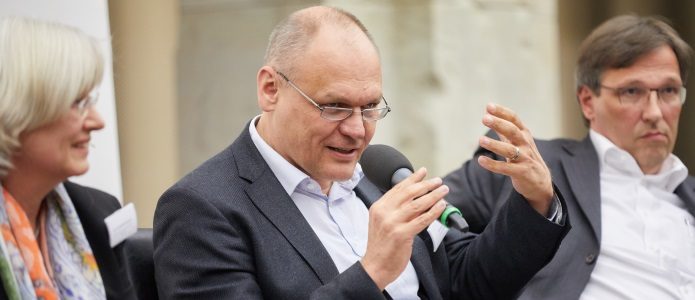 Johannes Ebert on „Competing Narratives"
| Photo: Bernhard Ludewig
"For our work at Goethe-Institut apart from the german narrative, the global narratives are even more important: How do we handle official narratives? Are there counterparts? Do we give them a voice?" (Johannes Ebert, general secretary Goethe-Institut)
Johannes Ebert on „Competing Narratives"
| Photo: Bernhard Ludewig
"For our work at Goethe-Institut apart from the german narrative, the global narratives are even more important: How do we handle official narratives? Are there counterparts? Do we give them a voice?" (Johannes Ebert, general secretary Goethe-Institut)